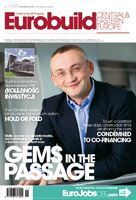Participants representing a range of professions in the property market and beyond gathered in the historic Dwór Artusa building in Gdańsk to find out about investment opportunities in two cities with some of the best economic potential in Europe It’s hard to know what to think about the crisis. Is it coming to an end in Poland or is the worst still ahead? There are those who say that now the German election has taken place, there’ll be some serious cuts and layoffs, with a ripple effect hitting Poland. And there are those who say that Poland is a unique case and has ridden out the storm. Certainly the country has not been hit as hard as many others.This might explain the mood of optimism at the Eurobuild conference entitled ‘Surfing towards new horizons’, despite the fact that we had the same story about the “lack of financing” and exasperated cries of “when will the banks start lending money?” as we have heard over the last 12 months. The Dwór Artusa buildi




























































